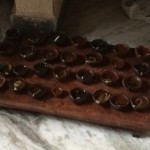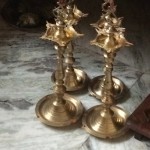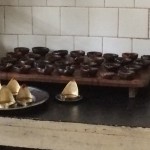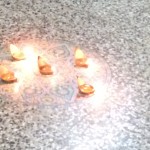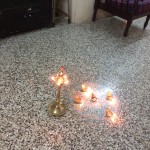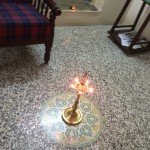My mum and Dad are so pleased that I am in India on the day of the festival of lights after a long time. In some southern parts of India, the festival of lights – Karthigai Deepam is celebrated from yesterday until Monday. It is confusing to anyone who doesn’t speak Tamil or Telugu – because it is hardly celebrated across the rest of India.
The streets are filled with lamp sellers – we use clay-lamps mostly and then tall bronze ones and lots of small bronze ones too. Some people would have silver ones just at the altar. We light using oil and cotton wick.

Then of course the main sweet for this festival is a ball of sugared-puffed-rice called Pori Urundai – it is so sweet that it bruises your tongue.

On Diwali, which translates to a row of lamps, most of India celebrates with lamps except the South. The south waits a few weeks and celebrates the festival of lights in the lunar month of Karthiga on a full-moon day.
We began preparing the lamps and lighted them inside the house and outside.
While India is a singular entity for the outside world – India is hardly homogenous. We are multi-cultural, multi-lingual, multi-religious just within India. We have every religion that the world practices and every religious sect within Hinduism and we always took for granted that the world was different and we had to live with that. We never had a situation where everyone looked the same, spoke the same that being different was difficult.
So we have three different reasons why we celebrate Diwali and how we celebrate it is very different too. So while the North celebrates Diwali with lamps to mark the occasion of Rama returning from Lanka on a new moon night, the south doesn’t light a row of lamps for Diwali. We wait until Karthigai Deepam and then light our lamps. We do save up the firecrackers from Diwali and burst them on this day. And even Karthigai Deepam has three different reasons for celebration depending on what your religious inclinations are.
In this difference lies some similarities too – when Diwali is celebrated in the north, one of the days is ear-marked for sisters praying for their brothers. Similarly when we celebrate Karthigai Deepam a few weeks later in the south, we too have a day earmarked for brothers. We pray for our brothers and visit them and eat together. As a kid, I remember all families from my Mum’s side would congregate at my Grandpa’s house – they were two brothers and three sisters and we would pray for each other’s siblings – I didn’t have a brother – so we prayed for our cousins and secretly for our classmates too.
The other common factor of course is great food, festival specials and temples that pray for the entire nation – with the coming of cable TV, the temples broadcast these prayers to a wider audience and my mum and dad were glued to the TV set this morning to watch the prayers in a city far away.
In a modern busy life where we all are running about – perhaps it is not a bad idea to have a day earmarked for siblings – so you could get together, think of each other if you can’t be together and enjoy good food regardless.
